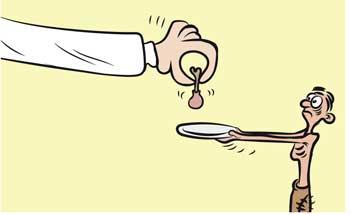05 Sep 2023 - {{hitsCtrl.values.hits}}
 It is a well-known fact now that the official figures of inflation and reality on the ground seem to be worlds apart, the former indicating a downward trend while the other does the other way around. In fact, the root cause of last year’s public unrest, except for the weeks-long and miles-long queues for fuel and cooking gas, is still in effect.
It is a well-known fact now that the official figures of inflation and reality on the ground seem to be worlds apart, the former indicating a downward trend while the other does the other way around. In fact, the root cause of last year’s public unrest, except for the weeks-long and miles-long queues for fuel and cooking gas, is still in effect.
One has to understand the huge scramble on the part of the members of the low-income stratum of society for the meagre amounts of money distributed by the government, under the newly introduced “social welfare” programme, Aswesuma, against this backdrop. Indeed, the authorities seem to have identified the effects of the programme when they named it Aswesuma (solace) instead of solution.
Aswesuma seems to be a programme prompted by the overall economic programme that is now underway involving the International Monetary Fund (IMF) which is aimed at bailing out the country from the unprecedented economic disaster it has faced with. The International lender has clearly understood the negative economic impact of the series of reforms it has recommended as preconditions for its assistance would push the poor and vulnerable groups from the frying pan to fire and has tagged a commitment for the government to mitigate those impacts and safeguard those groups. However, despite the other recommendations of the IMF being preconditions for the bailout package, this commitment seems not to be so.
From the beginning of the bailout programme for Sri Lanka, the IMF has been stressing the need to protect the poor from the effects of reforms. Peter Breuer and Masahiro Nozaki who led the staff-level discussion with the Sri Lankan officials in their statement issued after the staff-level agreement was arrived at on September 1, 2022, announced several key elements of the IMF programme one of which suggested to mitigate the impacts of the crisis
on the poor.
Again following the approval of the staff-level agreement by the Executive Board of the IMF on March 20, this year, its Managing Director, Kristalina Georgieva in a statement pointed out the need for protecting the poor and vulnerable while saying social safety nets should be strengthened and better targeted to the poor.
However, given the heavy impact of the economic crisis, the social benefit programmes -current and past - have always been a farce. The Chairman of the Welfare Benefit Board (WBB) that handles the Aswesuma project, N. Wijayaratne had said during a recent interview the beneficiaries under the Aswesuma programme have been categorized into four groups, namely the transitional, vulnerable, poor and extremely poor and that the first two groups numbering about 350,000 families are the people who sank below the poverty line recently due to the COVID-19 pandemic and the economic crisis. Each family of these two groups would be paid a monthly allowance of Rs. 2,500 and Rs. 5,000 respectively under Aswesuma. The families categorized as poor would be paid Rs. 8,000 monthly and the payment for an extremely poor family is Rs. 15,000.
A monthly allowance of Rs 2,500 payable to the category of “transitional” means just an additional income of Rs. 83 per day for a family and interestingly, this amount is paid to those who lived a relatively comfortable life until recently. Only the “extremely poor” family would receive an allowance of Rs 15,000 per month (Rs 500 per day) which would in fact help them.
However, the IMF’s condition to introduce cost-recovery-based pricing for fuel and electricity seems to have plundered these very benefits from the poor families. On the other hand, the official poverty line at the national level in December last year which was calculated by the Census and Statics Department to be a monthly income of Rs. 5,972 “per person” makes these so-called “safety nets” a mockery. Meanwhile, the middlemen mafia in every sphere makes life a hell for the poor. In that context, the lack of a viable strategy or at least the will on the part of the authorities to really mitigate the effects of the economic crisis is unfortunate.
27 Dec 2024 3 hours ago
27 Dec 2024 3 hours ago
27 Dec 2024 5 hours ago
27 Dec 2024 5 hours ago
27 Dec 2024 5 hours ago